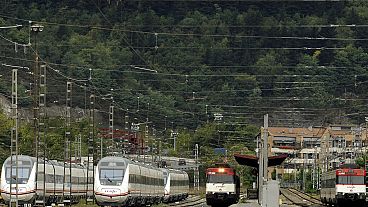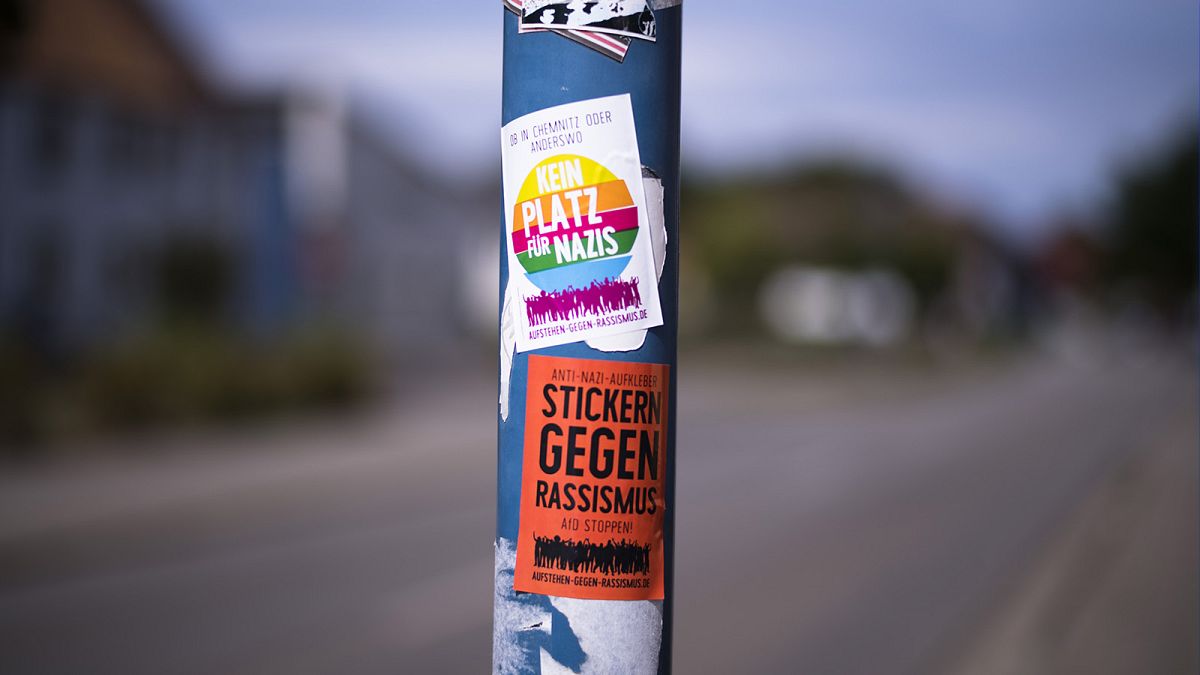Violence against politicians has been dominating the headlines, but instances of everyday racism and antisemitic attacks are causing German victim advice centres to sound the alarm. Euronews travelled to Thuringia, a right-wing hotspot, to speak with a victim of neo-Nazi violence.
Germany has witnessed a surge in far-right, racist, and antisemitic violence, reaching unprecedented levels in over a decade.
Mayar, a 20-year-old nurse who fled Syria during the war and has lived in Germany for nearly nine years, feels a strong sense of German identity, having grown up there. He recounted the moment of the attack in vivid detail.
"He (perpetrator) insulted me and then hit me. He choked me and pushed me against the train, and then he was strangling me with his thumbs pressed into my throat."
"His actions were inhumane; his intent was clearly not just to hurt me, but to cause severe harm," Mayar told Euronews.
Mayar says the perpetrator is a "known neo-Nazi, known for his crimes". Despite this being neither the first nor the last time the perpetrator committed a violent crime, the verdict was a suspended sentence.
Mayar said the crime had a big impact on him.
"During the day, things can be normal. I can still live my life, but it's actually hard for me to leave the house late at night. Especially where I live, at that location," he explained.
According to Mayar, his area is "very well-known for right-wing extremists". "I can't just go out whenever I want. Or I'm very cautious about such things myself. And the word 'security' is missing for me when it comes to going out at night."
Mayar witnesses the rise of racism firsthand.
"It's gotten worse since before. For about a year, I've noticed that it's become much, much more common. So, on the street, you see it very often by now. For me, on average, every two weeks, (or) one to two weeks, I myself either am part of such cases on the street or I'm a witness to them. Also on the internet, it's become every day for me to simply see racism," he said.
He blamed the rise in support for the AfD, which has been designated as "suspected extremist" by a German court since 2021.
"Whenever I think that sometime in the future, I could be deported just because I come from a different country, even though I grew up here, it's sad, it scares me, and it makes me feel like a stranger. Now and then, I wonder, do I belong to the Arabs? Am I too German? And to the Germans, am I too much Arab? It's not a nice feeling, definitely not."
There is a direct link between the increase in right-wing violence and support for the far-right party Alternative for Germany (AfD), currently polling second nationwide and expected to make sweeping gains in the upcoming elections in three eastern states, Victim support group Ezra told Euronews.
Country-wide mass protests were triggered in January when it emerged that AfD members held a secret meeting with German and Austrian far-right figures, including the neo-Nazi leader of the Identitarian movement Martin Sellner, to discuss a "remigration" plan. Those present are said to have discussed deporting hundreds of thousands, sometimes naturalised German citizens, back to their countries of origin.
Whilst figures released by the Association of Counselling Centres for Victims of Right-Wing, Racist, and Anti-Semitic Violence e.V. (VBRG) put the number of attacks at a record high of 3,384, this number is only the tip of the iceberg.
Not all crimes are reported to police and victim support centres, and the figures are only tallied from 11 out of 16 federal states.
Convictions 'can take years'
Spokesperson of Ezra, Franz Zobel, said there is a direct link between the increase in violence and AfD support.
"Here, we had a strong increase, especially in the Sonneberg district. This is the district where an AfD politician was elected district administrator for the first time. And there we experienced a massive increase in right-wing violence," he told Euronews.
Zobel pointed to a representative study by Prof Dr Dancygier from Princeton University that suggests between 38.7% and 42.5% of hate crime supporters would vote for AfD.
But Zobel also said the increase in attacks isn't just limited to Thuringia or even Germany.
"The AfD and other extreme right-wing parties in Europe are very well connected and they are therefore also the greatest threat to the European Union and also to the idea of Europe and to the people because they experience this. This strengthening is not only in Germany or in East Germany, but we see this throughout Europe."
Zobel also said that many AfD supporters "simply feel legitimised to strike" and underlined the cases of AfD politicians who have attacked people themselves.
According to investigative outlet Correctiv, "48 AfD representatives and employees at district, state and federal level have recently been involved in violent acts".
28 of these politicians have reportedly been convicted by a court or had penal orders issued against them — and 14 are still politically active.
At least five other AfD representatives are under investigation, with some of the cases involving physical attacks and incitement to hatred.
"Here (perpetrators) know that no consequences threaten them. If there are any, it’s only after years and with mild sentences. And then they don’t have to answer for the political motive behind their inhumanity," Zobel said.
Zobel said Thuringia especially has a problem with the judiciary, and many of the sentences are very mild.
"We have trials that take eight years until there is a conviction in the end. There are further problems that the motives are very, very rarely recognised. So in the judgments, you rarely find again that it is, for example, a racist offense."
For example, in the case of Mayar, the conviction took several years.
"In the case here, for example, it concerns an organised neo-Nazi, so he (perpetrator) is part of the organised neo-Nazi scene. He has already been noticed with over ten offenses before, he has repeatedly been fined, and now, in the end, there is again a suspended sentence," the spokesperson says.
"This encourages perpetrators to commit far-right and racist violence, because without consequences, the perpetrators feel safe."
According to the German newspaper TAZ, judges in the Thuringia district of Gera share close ties with AfD politicians, both locally and nationally, quoting statistics of judges deciding in favour of asylum seekers in single-digit percentages. The judges have denied having any right-wing-leaning biases.












